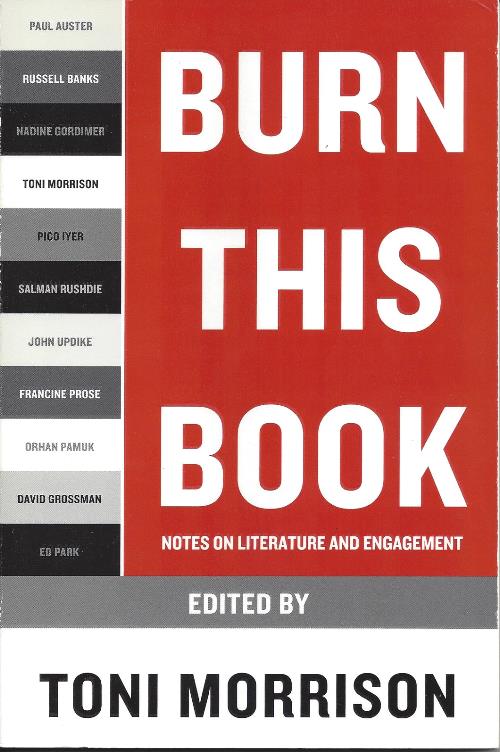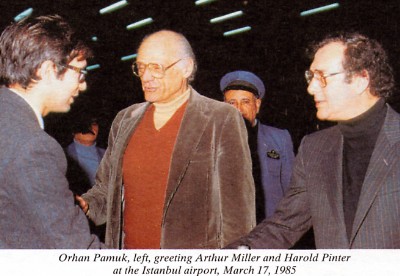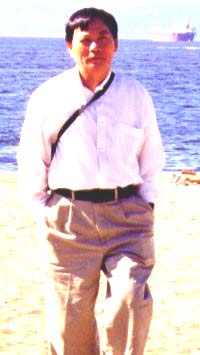|
Tự Do Viết
Hãy đốt cuốn
sách này

A writer's life and work
are not a gift to mankind;
they are its necessity.
Toni Morrison
Cuộc đời và tác phẩm của
một nhà văn đếch phải là một món quà cho nhân
loại. Chúng là sự cần thiết của nó.
Tuyệt cú mèo!
Tự Do Viết

Đọc tại PEN cùng dịp với
DTH.
Vào Tháng Ba
1985, Arthur Miller và Harold Pinter ghé Istanbul. Vào lúc đó, hai đấng
này có
lẽ là hai khuôn mặt nổi cộm nhất trong giới kịch nghệ trên thế giới,
nhưng chán
mớ đời, không phải vì kịch cọt mà ông ghé Istanbul, mà vì những bóp
nghẹt tàn
nhẫn tự do ăn nói, viết lách, diễn đạt tư tưởng, ý nghĩ… vào thời gian
đó, và
vì rất nhiều nhà văn đang bị nhà nước bắt bỏ tù. Vào năm 1980 có 1 cú
đảo chánh
ở Thổ, và hàng ngàn người bị bắt, và tất nhiên, luôn luôn là giới cầm
viết bị
chiếu cố nặng nề nhất…. Hai đấng trên, đến Istanbul, là để gặp họ, gia
đình họ
để an ủi, động viên, trợ giúp, và bố cáo thế giới về số phận của họ.
Chuyến đi
của họ là do PEN sắp xếp cùng với Uỷ Ban Helsinki Watch Committee. Tôi
tới phi
trường để đón họ. Tôi được đề nghị cái job trên, không phải vì tôi rất
ư là sốt
sắng, rất thích đâm sầm vào chính trị, mà bởi vì tôi là 1 tiểu thuyết
gia nói
trơn tru tiếng Anh, và tôi hoan hỉ chấp nhận, cũng không hẳn là do, đó
là 1
cách để có tí đóng góp trong nghĩa cả, tức giúp đỡ những bạn đang trong
cơn khốn
khó, nhưng như thế có nghĩa là, sẽ được trải qua vài ngày sánh vai dạo
bước với
hai đấng nổi tiếng!
Chúng tôi
cùng nhau đi thăm những nhà xb nhỏ đang phải vật lộn, những văn phòng
bề bộn
nơi làm tin, newsrooms, những trung tâm, khu vực âm
u, bụi bặm, của những tạp chí đang trên đà
sập tiệm, chúng tôi đi từ nhà này sang nhà nọ, tiệm ăn này qua tiệm ăn
khác, để
gặp những nhà văn đang gặp rắc rối, và gia đình của họ.
Cho tới khi
đó, tôi còn đứng bên lề của thế giới chính trị, chẳng bao giờ tiến vô,
ngoại trừ
ép buộc, nhưng bây giờ, khi tai tôi nghe những câu chuyện nghẹt thở,
gây sốc, của
bách hại, của tàn nhẫn, độc ác, và cái ác trần trụi, toang hoác, tôi
cảm thấy
mình bị cuốn vô nó, qua cái cảm giác cảm thấy mình có lỗi, phạm tội –
không chỉ
bị cuốn hút vào nó, qua mặc cảm phạm tội, nhưng mà còn qua liên đới
trách nhiệm,
qua tinh thần đoàn kết, nhưng cùng 1 lúc, tôi cảm thấy ước muốn, cũng
bằng như
thế, nhưng ngược lại: tự bảo vệ mình, khỏi tất cả những điều này, và
chẳng làm
bất cứ điều gì trên đời, ngoài việc, viết ra những cuốn tiểu thuyết
thần sầu,
tuyệt đẹp.
Khi tôi đưa Miller và
Pinter bằng tắc xi từ điểm
hẹn này tới điểm hẹn khác, qua đường xá, xe cộ Istanbul, tôi nhớ lại,
như thế nào
chúng tôi lèm bèm về những người bán hàng rong, street vendors, những
chiếc xe
ngựa, những tấm quảng cáo, những người phụ nữ mang khăn choàng, hay
không mang
khăn choàng luôn quyến rũ cái nhìn của của những khách ngoại quốc, tuy
nhiên tôi
thật nhớ rõ một hình ảnh: tại cuối một hành lang thật dài của khách sạn
Istanbul Hilton, tôi và bạn tôi [người cùng tôi đón tiếp hai vị khách
quí] thì thầm vào tai nhau, trong 1 trạng
thái rất kích
động, thì cũng khi đó, Miller và Pinter cũng đang thì thầm ở cuối đầu
hành lang
kia, trong bóng tối, và cũng bằng 1 sự kích động u tối.
Hình ảnh này đóng khằn
vào cái đầu đang xốn xang của tôi, và tôi nghĩ, đây là hình ảnh nói lên
khoảng cách lớn lao giữa những câu chuyện, những lịch sử đầy rắc rối đa
đoan của
chúng tôi, và của họ, nhưng cùng lúc, nó cũng nói lên sự liên đới trách
nhiệm, sự
đoàn kết giữa những nhà văn, và đây là 1 điều có thể thực hiện được.
Freedom to Write
By Orhan Pamuk, Translated by Maureen
Freely
The following was given on April 25 as
the inaugural PEN
Arthur Miller Freedom to Write Memorial Lecture.
In March 1985 Arthur Miller and Harold Pinter made a trip
together to Istanbul.
At the time, they were perhaps the two most important names in world
theater,
but unfortunately, it was not a play or a literary event that brought
them to Istanbul, but the ruthless
limits being set on freedom of
expression in Turkey
at that time, and the many writers languishing in prison. In 1980 there
was a
coup in Turkey,
and hundreds of thousands of people were thrown into prison, and as
always, it
was writers who were persecuted most vigorously. Whenever I've looked
through
the newspaper archives and the almanacs of that time to remind myself
what it
was like in those days, I soon come across the image that defines that
era for
most of us: men sitting in a courtroom, flanked by gendarmes, their
heads
shaven, frowning as their case proceeds.... There were many writers
among them,
and Miller and Pinter had come to Istanbul
to meet with them and their families, to offer them assistance, and to
bring
their plight to the attention of the world. Their trip had been
arranged by PEN
in conjunction with the Helsinki Watch Committee. I went to the airport
to meet
them, because a friend of mine and I were to be their guides.
I had been proposed for this job not
because I had anything to
do with politics in those days, but because I was a novelist who was
fluent in
English, and I'd happily accepted, not just because it was a way of
helping
writer friends in trouble, but because it meant spending a few days in
the
company of two great writers. Together we visited small and struggling
publishing houses, cluttered newsrooms, and the dark and dusty
headquarters of
small magazines that were on the verge of shutting down; we went from
house to
house, and restaurant to restaurant, to meet with writers in trouble
and their
families. Until then I had stood on the margins of the political world,
never
entering unless coerced, but now, as I listened to suffocating tales of
repression, cruelty, and outright evil, I felt drawn to this world
through guilt—
drawn to it, too, by feelings of solidarity, but at the same time I
felt an
equal and opposite desire to protect myself from all this, and to do
nothing in
life but write beautiful novels. As we took Miller and Pinter by taxi
from
appointment to appointment through the Istanbul
traffic, I remember how we discussed the street vendors, the horse
carts, the
cinema posters, and the scarfless and scarf-wearing women that are
always so
interesting to Western observers. But I clearly remember one image: at
one end
of a very long corridor in the Istanbul Hilton, my friend and I are
whispering
to each other with some agitation, while at the other end, Miller and
Pinter
are whispering in the shadows with the same dark intensity. This image
remained
engraved in my troubled mind, I think, because it illustrated the great
distance between our complicated histories and theirs, while suggesting
at the
same time that a consoling solidarity among writers was possible.
I felt the same sense
of mutual pride and shared shame in every
other meeting we attended—room after room of troubled and chain-smoking
men. I
knew this because sometimes it was expressed openly, and sometimes I
felt it
myself or sensed it in other people's gestures and expressions. The
writers,
thinkers, and journalists with whom we were meeting mostly defined
themselves
as leftists in those days, so it could be said that their troubles had
much to
do with the freedoms held dear by Western liberal democracies. Twenty
years on,
when I see that half of these people—or thereabouts, I don't have the
precise
numbers—now align themselves with a nationalism that is at odds with
Westernization and democracy, I of course feel sad.
My experience as a
guide, and other like experiences in
later years, taught me something that we all know but that I would like
to take
this opportunity to emphasize. Whatever the country, freedom of thought
and
expression are universal human rights. These freedoms, which modern
people long
for as much as bread and water, should never be limited by using
nationalist
sentiment, moral sensitivities, or— worst of all—business or military
interests. If many nations outside the West suffer poverty in shame, it
is not
because they have freedom of expression but because they don't. As for
those
who emigrate from these poor countries to the West or the North to
escape
economic hardship and brutal repression—as we know, they sometimes find
themselves further brutalized by the racism they encounter in rich
countries.
Yes, we must also be alert to those who denigrate immigrants and
minorities for
their religion, their ethnic roots, or the oppression that the
governments of
the countries they've left behind have visited on their own people.
But to respect the
humanity and religious beliefs of
minorities is not to suggest that we should limit freedom of thought on
their
behalf. Respect for the rights of religious or ethnic minorities should
never
be an excuse to violate freedom of speech. We writers should never
hesitate on
this matter, no matter how "provocative" the pretext. Some of us have
a better understanding of the West, some of us have more affection for
those
who live in the East, and some, like me, try to keep our hearts open to
both
sides of this slightly artificial divide, but our natural attachments
and our
desire to understand those unlike us should never stand in the way of
our
respect for human rights.
I always have
difficulty expressing my political judgments
in a clear, emphatic, and strong way—I feel pretentious, as if I'm
saying
things that are not quite true. This is because I know I cannot reduce
my
thoughts about life to the music of a single voice and a single point
of view—I
am, after all, a novelist, the kind of novelist who makes it his
business to
identify with all of his characters, especially the bad ones. Living as
I do in
a world where, in a very short time, someone who has been a victim of
tyranny
and oppression can suddenly become one of the oppressors, I know also
that
holding strong beliefs about the nature of things and people is itself
a
difficult enterprise. I do also believe that most of us entertain these
contradictory thoughts simultaneously, in a spirit of good will and
with the
best of intentions. The pleasure of writing novels comes from exploring
this
peculiarly modern condition whereby people are forever contradicting
their own
minds. It is because our modern minds are so slippery that freedom of
expression becomes so important: we need it to understand ourselves,
our shady,
contradictory, inner thoughts, and the pride and shame that I mentioned
earlier.
So let me tell another story that
might cast some light on
the shame and pride I felt twenty years ago while I was taking Miller
and Pinter
around Istanbul.
In the ten years following their visit, a series of coincidences fed by
good
intentions, anger, guilt, and personal animosities led to my making a
series of
public statements on freedom of expression that bore no relation to my
novels, and
before long I had taken on a political persona far more powerful than I
had
ever intended. It was at about this time that the Indian author of a
United
Nations report on freedom of expression in my part of the world—an
elderly
gentleman—came to Istanbul
and looked me up. As it happened, we, too, met at the Hilton Hotel. No
sooner
had we sat down at a table than the Indian gentleman asked me a
question that
still echoes strangely in my mind: "Mr. Pamuk, what is there going on
in
your country that you would like to explore in your novels but shy away
from,
due to legal prohibitions?"
There followed a long silence. Thrown
by his question, I
thought and thought and thought. I plunged into an anguished
Dostoevskyan
self-interrogation. Clearly, what the gentleman from the UN wished to
ask was,
"Given your country's taboos, legal prohibitions, and oppressive
policies,
what is going unsaid?" But because he had—out of a desire to be polite,
perhaps?—asked the eager young writer sitting across from him to
consider the
question in terms of his own novels, I, in my inexperience, took his
question
literally. In the Turkey
of ten years ago, there were many more subjects kept closed by laws and
oppressive state policies than there are today, but as I went through
them one
by one, I could find none that I wished to explore "in my novels."
But I knew, nonetheless, that if I said "there is nothing I wish to
write
in my novels that I am not able to discuss," I'd be giving the wrong
impression. For I'd already begun to speak often and openly about all
these
dangerous subjects outside my novels. Moreover, didn't I often and
angrily
fantasize about raising these subjects in my novels, just because they
happened
to be forbidden? As I thought all this through, I was at once ashamed
of my
silence, and reconfirmed in my belief that freedom of expression has
its roots
in pride, and is, in essence, an expression of human dignity.
I have personally known writers who
have chosen to raise
forbidden topics purely because they were forbidden. I think I am no
different.
Because when another writer in another house is not free, no writer is
free.
This, indeed, is the spirit that informs the solidarity felt by PEN, by
writers
all over the world.
Sometimes my friends
rightly tell me or someone else,
"You shouldn't have put it quite like that; if only you had worded it
like
this, in a way that no one would find offensive, you wouldn't be in so
much
trouble now." But to change one's words and package them in a way that
will be acceptable to everyone in a repressed culture, and to become
skilled in
this arena, is a bit like smuggling forbidden goods through customs,
and as
such, it is shaming and degrading.
The theme of this
year's PEN festival is reason and belief.
I have related all these stories to illustrate a single truth —that the
joy of
freely saying whatever we want to say is inextricably linked with human
dignity. So let us now ask ourselves how "reasonable" it is to
denigrate cultures and religions, or, more to the point, to mercilessly
bomb
countries, in the name of democracy and freedom of thought. My part of
the
world is not more democratic after all these killings. In the war
against Iraq,
the
tyrannization and heartless murder of almost a hundred thousand people
has
brought neither peace nor democracy. To the contrary, it has served to
ignite
national-ist, anti-Western anger. Things have become a great deal more
difficult for the small minority who are struggling for democracy and
secularism in the Middle East. This
savage,
cruel war is the shame of America
and the West. Organizations like PEN and writers like Harold Pinter and
Arthur
Miller are its pride.
Copyright © 2006 by
Ohan Pamuk; English translation
copyright © 2006 by Maureen Freely.
|


